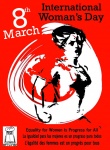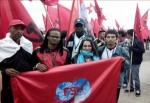The First National Women Conference of CONEP, Nepal, was held in Kathmandu , Nepal on March 6-8, 2014. WFTU was represented by cde Chrysoula Lampoudi, WFTU Women Secretariat Executive, Vice President of the FISE, teacher trade unionist and president of teacher’s union in Athens.
Conference of CONEP, Nepal, was held in Kathmandu , Nepal on March 6-8, 2014. WFTU was represented by cde Chrysoula Lampoudi, WFTU Women Secretariat Executive, Vice President of the FISE, teacher trade unionist and president of teacher’s union in Athens.
On behalf of the WFTU, cde Chrysoula Lampoudi delivered the following speech:
“On behalf of the WFTU, on behalf of the FISE, I salute each and every one of you here today, warmly and militantly. Saluting you, we also salute the women of Nepal, the working class of Nepal.
of Nepal, the working class of Nepal.
 The 8th of March is marked with blood and the struggles of women
The 8th of March is marked with blood and the struggles of women worldwide, for the rights to life, to equality, to education and employment, for the right to give birth and raise children in a society free
worldwide, for the rights to life, to equality, to education and employment, for the right to give birth and raise children in a society free from the exploitation of man by man.
from the exploitation of man by man.
The problems faced by women are not the same in all countries and they certainly differ in quantity and difficulties, but everywhere around the whole capitalist world women experience this double exploitation due to their dual role and due to the fact that inequality women face is firstly and foremost a class oriented issue. This means that it is a problem born and reproduced in any class society where the labor force is used so that these who own the production means, increase their profits, ripping off the sweat and work of the working class.
are not the same in all countries and they certainly differ in quantity and difficulties, but everywhere around the whole capitalist world women experience this double exploitation due to their dual role and due to the fact that inequality women face is firstly and foremost a class oriented issue. This means that it is a problem born and reproduced in any class society where the labor force is used so that these who own the production means, increase their profits, ripping off the sweat and work of the working class.
 According to capitalists, women
According to capitalists, women are machines, which can, due to the labour force women have, produce profits for capitalists, and at the same time women are machines giving birth and bringing up children and preparing the new shift of the working class.
are machines, which can, due to the labour force women have, produce profits for capitalists, and at the same time women are machines giving birth and bringing up children and preparing the new shift of the working class.
The class- oriented trade union movement, utilizing the experience and achievements of the socialist system, has been fighting for the real equality of women , for the women’s active participation in the labor movement, for the people to know the nature of the special problems women face and for the women to learn to demand their rights, despite what slavery, feudalism, capitalism, different religions and generally all these systems favoring the double exploitation of women have deliberately loaded on women’s shoulders for centuries.
, for the women’s active participation in the labor movement, for the people to know the nature of the special problems women face and for the women to learn to demand their rights, despite what slavery, feudalism, capitalism, different religions and generally all these systems favoring the double exploitation of women have deliberately loaded on women’s shoulders for centuries.
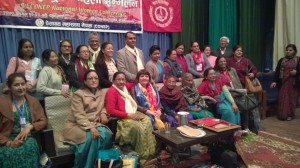 The WFTU does not differentiate women
The WFTU does not differentiate women ’s struggles from the struggles for liberation and the rights of the working class. The struggle for women’s problems is first and foremost a cause of the working class; it is a cause of our class. Men and women should together give the battle against the system that generates the exploitation and inequality.
’s struggles from the struggles for liberation and the rights of the working class. The struggle for women’s problems is first and foremost a cause of the working class; it is a cause of our class. Men and women should together give the battle against the system that generates the exploitation and inequality.
We know very well that in the developed capitalist countries, when more workers were needed, more labor rights and privileges were given to women . Under the applied pressure by the class oriented trade union movement and the primacy of socialism, women’s status improved worldwide. Education, the right to vote, the right to work, laws protecting women, are some of the things women gained in many countries- in some countries all these happened years ago while in others more recently. However, inequality continues to exist and in many countries women were and are still the cheaper labor force, which can be used as a stepping stone so that rights can be abolished even for male workers; for example to reduce wages, to impose flexible working conditions, to violate holidays or the 8- hour working day, etc.
. Under the applied pressure by the class oriented trade union movement and the primacy of socialism, women’s status improved worldwide. Education, the right to vote, the right to work, laws protecting women, are some of the things women gained in many countries- in some countries all these happened years ago while in others more recently. However, inequality continues to exist and in many countries women were and are still the cheaper labor force, which can be used as a stepping stone so that rights can be abolished even for male workers; for example to reduce wages, to impose flexible working conditions, to violate holidays or the 8- hour working day, etc.
 We live in the era where computers, science and technology prevail. However, women of our class have yet to solve the problems that the system burdens them with, because they work, because they give birth and they have to look after their families. Developments in technology and science have not been used to give women more leisure time, quality of life, safe parenting, and respect to their biological differences. On the contrary, exploitation continues, the life of working women is turned upside down so that women can combine the role of working mother, housewife and where there are social taboos and superstitions women continue to be the property of men. The deeper the exploitation of women is and the greater the inequality women face is, the more anti-peoples and unfriendly the system for the whole working class is. Things like the status of women, the active participation of women in trade unions, the protection of motherhood, etc., show the overall living standards of the working class. The mandatory participation of women in public life, set by law in some countries, does not solve the problems of women if, at the same take, no measures are taken to enable all women to participate consciously in the trade unions, governments, the centres of organisation of struggles.
We live in the era where computers, science and technology prevail. However, women of our class have yet to solve the problems that the system burdens them with, because they work, because they give birth and they have to look after their families. Developments in technology and science have not been used to give women more leisure time, quality of life, safe parenting, and respect to their biological differences. On the contrary, exploitation continues, the life of working women is turned upside down so that women can combine the role of working mother, housewife and where there are social taboos and superstitions women continue to be the property of men. The deeper the exploitation of women is and the greater the inequality women face is, the more anti-peoples and unfriendly the system for the whole working class is. Things like the status of women, the active participation of women in trade unions, the protection of motherhood, etc., show the overall living standards of the working class. The mandatory participation of women in public life, set by law in some countries, does not solve the problems of women if, at the same take, no measures are taken to enable all women to participate consciously in the trade unions, governments, the centres of organisation of struggles.
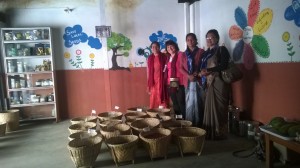 Of course, women who belong to bourgeoisie, have no financial problems, have no problems time wise, and solve easily problems like childcare, care of the family; these women, if they want to, can easily get involved with public life, or rise in the hierarchy in managerial positions, in positions that require time and dedication. The thing we must have in mind is that women of the bourgeoisie represent the interests of their class, the interests of the monopolies and whenever they have or express sensitivities to women’s issues, these sensitivities are nothing more than charity. Examples of these women are women like Merkel (the German Chancellor), Lagarde (the Head of the IMF), Tymoshenko (former Prime Minister of Ukraine), and Hillary Clinton (former Secretary of State the USA) who perfectly serve the interests of multinationals, support the imperialist interventions and consciously tolerate the consequences of wars they motivate, women trafficking, poverty and destitution, hunger and prostitution of young children, the deprivation of fundamental rights of young girls, young women, older women, and of course the double exploitation. Women like the ones mentioned above support the mechanism that wants the working class, men women, and children, to be cheap, expendable material for the imperialists to increase their profits. Capitalism does not want, and of course it is not in its best interest, to give up the exploitation of women and, of the working class as a whole, of course. Capitalism has an interest in trying to fool our class, with temporary benefits, pushing women to volunteer work, part-time jobs
Of course, women who belong to bourgeoisie, have no financial problems, have no problems time wise, and solve easily problems like childcare, care of the family; these women, if they want to, can easily get involved with public life, or rise in the hierarchy in managerial positions, in positions that require time and dedication. The thing we must have in mind is that women of the bourgeoisie represent the interests of their class, the interests of the monopolies and whenever they have or express sensitivities to women’s issues, these sensitivities are nothing more than charity. Examples of these women are women like Merkel (the German Chancellor), Lagarde (the Head of the IMF), Tymoshenko (former Prime Minister of Ukraine), and Hillary Clinton (former Secretary of State the USA) who perfectly serve the interests of multinationals, support the imperialist interventions and consciously tolerate the consequences of wars they motivate, women trafficking, poverty and destitution, hunger and prostitution of young children, the deprivation of fundamental rights of young girls, young women, older women, and of course the double exploitation. Women like the ones mentioned above support the mechanism that wants the working class, men women, and children, to be cheap, expendable material for the imperialists to increase their profits. Capitalism does not want, and of course it is not in its best interest, to give up the exploitation of women and, of the working class as a whole, of course. Capitalism has an interest in trying to fool our class, with temporary benefits, pushing women to volunteer work, part-time jobs , low paid jobs; pushing women to accept exploitation, to accept unequal pay, even where great struggles had been given and equal pay for equal work had been institutionalised; even if this was one of the main slogans of women who marched in Chicago in 1886 and in whose honour the global day of women was set.
, low paid jobs; pushing women to accept exploitation, to accept unequal pay, even where great struggles had been given and equal pay for equal work had been institutionalised; even if this was one of the main slogans of women who marched in Chicago in 1886 and in whose honour the global day of women was set.
 The inequality and the double exploitation of women
The inequality and the double exploitation of women is clearly a class issue. It has been addressed by Marx and Lenin, who first spoke of class exploitation. Movements, political parties, trade unions who only express sex inequality only want to prolong dependency and subordination of women in the exploitative system.
is clearly a class issue. It has been addressed by Marx and Lenin, who first spoke of class exploitation. Movements, political parties, trade unions who only express sex inequality only want to prolong dependency and subordination of women in the exploitative system.
The WFTU since its founding has paid particular attention to the participation of women in trade unions, to the full viewing of the special problems of women and the development of struggles for women’s issues. The Women’s Secretariat of the WFTU was the first secretariat restructured after the Cuba Congress in 2005, where its new course was set. In these eight years a lot of positive steps have been done
in trade unions, to the full viewing of the special problems of women and the development of struggles for women’s issues. The Women’s Secretariat of the WFTU was the first secretariat restructured after the Cuba Congress in 2005, where its new course was set. In these eight years a lot of positive steps have been done , but the need for special work of all unions on women, the need for developing class consciousness in young women, young mothers, is as important as the development of the global labour movement.
, but the need for special work of all unions on women, the need for developing class consciousness in young women, young mothers, is as important as the development of the global labour movement.
 In this effort all men and women
In this effort all men and women should help. All teachers should help, utilising their educational status.
should help. All teachers should help, utilising their educational status.
The FISE, Worldwide teachers union and the WFTU will intensify their efforts for the development and promotion of women’s issues. The WFTU is preparing an international conference for women in 2014.
All the unions affiliated to the WFTU must contribute to the further development of the global trade union. You all know that the WFTU defends the rights of the working class and the rights of motherhood. It is an internationalistic organisation where solidarity is in its everyday practice. The WFTU is in constant conflict with the governmental trade unions, with the ITUC. ITUC clearly participates in and fully supports imperialist attacks in Iraq, Palestine and elsewhere, fully supports multinationals and monopolies, capitalist development and, of course, is totally hostile to our class interests.
The FISE, which I also represent, and the WFTU will intensify the efforts to make women’s issues more publicly known.
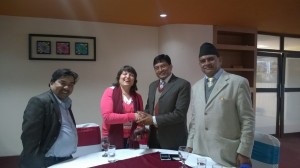 The congress of working women in Asia, in which you will take part, will take place in July 2014, while at the end of 2014, the worldwide congress of the WFTU for working women will also be held.
The congress of working women in Asia, in which you will take part, will take place in July 2014, while at the end of 2014, the worldwide congress of the WFTU for working women will also be held.
Of course it is known to you that a very important meeting will be held here in Nepal in September 2014 about the problems public servants face.
Furthermore, we also want CONEP and all the affiliated organisations of the WFTU to work for the worldwide action day, which, this year, is dedicated to unemployment.
We want all the members of the WFTU, 86 million workers, members of the affiliated unions, in 120 countries to intensify their work, so that the WFTU and all of us will become stronger.
We want our interventions in every global institution we are a member, like ILO in Geneva, FAO in Italy, Unesco in Paris, UN in New York , to be more fruitful.
, to be more fruitful.
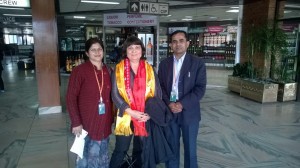 The class oriented direction the WFTU follows is a challenge and it is the best choice in the struggles for our rights, in the struggle to abolish capitalist exploitation.
The class oriented direction the WFTU follows is a challenge and it is the best choice in the struggles for our rights, in the struggle to abolish capitalist exploitation.
For us the verses of the great poet Berthold Brecht: ‘Why? Why there is no meat in the kitchen is not a question to be answered in the kitchen”, mark the path we must follow.
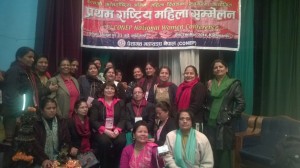 We need struggles of men and women through strong class trade unions, through strong CONEP, strong WFTU.
We need struggles of men and women through strong class trade unions, through strong CONEP, strong WFTU.
We thank the organizers of the event.
Long Live the women of the working class of Nepal.
Long live the women of the working class worldwide. ”
Lampoudi Chrisoula
The vice president of FISE at the 1st First National Women Conference of CONEP, Nepal


